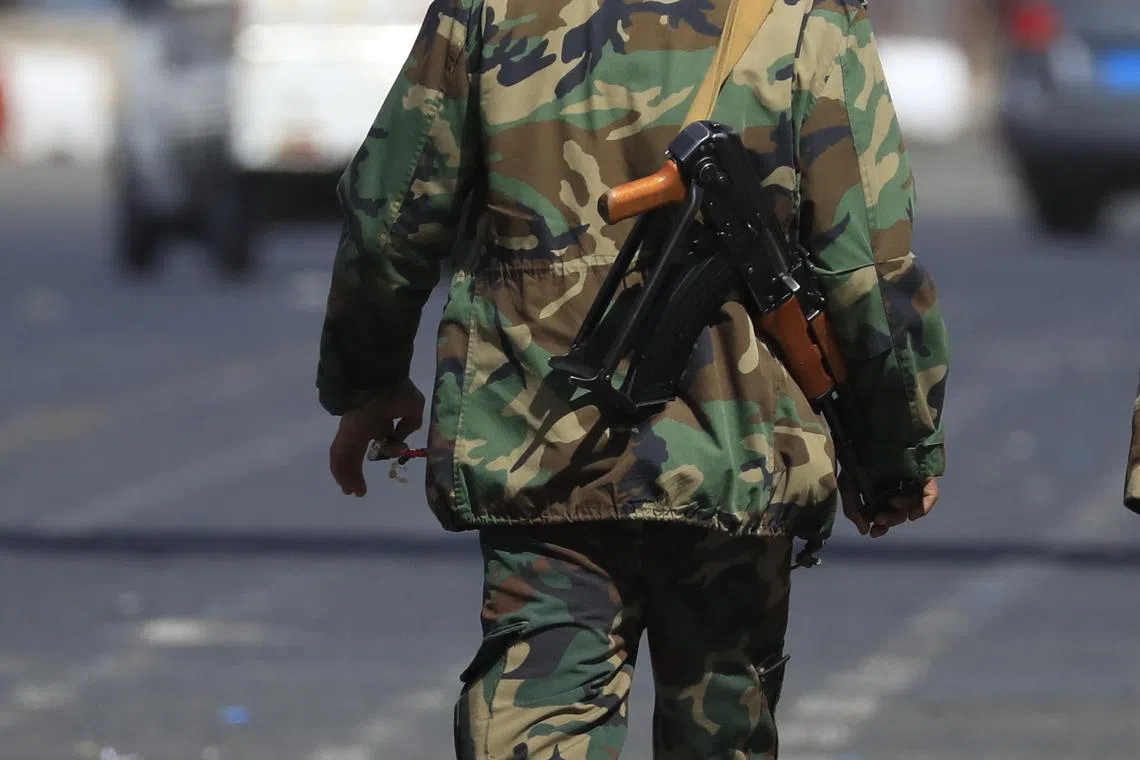With missiles and ship attacks, Yemen’s Houthis gain regional clout
Sign up now: Get ST's newsletters delivered to your inbox

The Houthis are being hailed as one of the only regional forces willing to challenge Israel with more than harsh words.
PHOTO: EPA-EFE
RIYADH, Saudi Arabia – Shooting missiles towards Israel and attacking ships sailing through the Red Sea, Yemen’s Houthi militia has been gaining popularity across the Middle East and building regional clout that could help expand its power at home, analysts say.
In a major escalation of Houthi actions against Israel, the Iran-backed militia hit a Norwegian tanker on Dec 11 with a cruise missile.
It was one of its first successful strikes after weeks of threats, although no casualties were reported.
The Houthis have also attempted missile and drone attacks on southern Israel, but those were thwarted. In November, they hijacked a commercial ship
Across the Middle East, the war in the Gaza Strip has left citizens seething with anger at Israel and the United States – and, in some cases, at their own American-backed governments.
But people have also hailed the Houthis as one of the only regional forces willing to challenge Israel with more than harsh words.
“What they did has given us dignity, because they did this in a time when everyone was watching idly,” said Mr Khalid Nujaim, who works at a medical supply company in Sanaa, the Yemeni capital, which is controlled by the Houthis.
A once-scrappy tribal group, the Houthis have taken over much of northern Yemen since they stormed Sanaa in 2014.
They have gradually increased their military capabilities and effectively won a war against a Saudi-led coalition that spent years trying to rout them.
Now that the most intense fighting in Yemen’s civil war has largely died down, the armed group is increasingly functioning as a de facto government.
They have described their recent attacks as a campaign in solidarity with the 2.2 million Palestinians living under Israel’s siege and bombardment of Gaza, which was launched in response to an Oct 7 attack by Hamas
That campaign has transformed the Houthis from a local and regional force into one with a global impact, said Mr Yoel Guzansky, a senior research fellow at Tel Aviv University’s Institute for National Security Studies.
“At the end of the day, what they really want is a bigger stake in Yemen, and perhaps they want to do that through becoming a global problem,” said Mr Guzansky, a former Israeli official.
Particularly now, when the Houthis are on the verge of a peace deal with Saudi Arabia that would potentially recognise their control over northern Yemen, the war in Gaza is “a massive opportunity for them to get legitimacy in the region”, said Mr Farea al-Muslimi, a Yemeni research fellow at the Middle East and North Africa programme at Chatham House, a London-based research group.
“Right now, everyone who is in the region is confusing the Yemenis with the Houthis, and for the Houthis, that’s the best thing that can happen.”
In statements announcing their attacks, the Houthis call themselves the “Yemen armed forces” – brushing aside the presence of an internationally recognised government and other armed groups based in the country’s south.
On Dec 12, Mohammed Ali al-Houthi, a senior member of the Houthi movement, posted a warning on social media outlining the risks of travelling in the Red Sea.
He told ships not to travel to “occupied ports in Palestine” and to be prepared to respond to orders from “the Yemeni navy”.
These days, wherever he goes in the region, Mr Ahmed Nagi, a senior Yemen analyst at the International Crisis Group, finds that people are thrilled to learn that he is from Yemen, and quickly begin “talking about the Houthis and how brave they are”, he said.
“This is a very deep reflection of public opinions across the Arab countries at this moment,” Mr Nagi said.
He expressed concern that people might increasingly believe that they cannot trust their state actors, and that non-state actors such as the Houthis are their only hope to challenge what they see as Western hegemony.
Support for the Palestinian cause and hostility towards Israel has long been a pillar of the Houthi narrative. “Death to America, death to Israel” is in the group’s slogan.
Part of the way they frame themselves is in opposition to American-backed Arab leaders, whom they view as “just mercenaries for the West”, Mr Nagi said.
At a news briefing on Dec 12, Mr Eylon Levy, an Israeli government spokesman, described the Houthis as Iranian proxies
He called their attacks “a clear threat not only to Israel, but also to international peace and security”. NYTIMES


